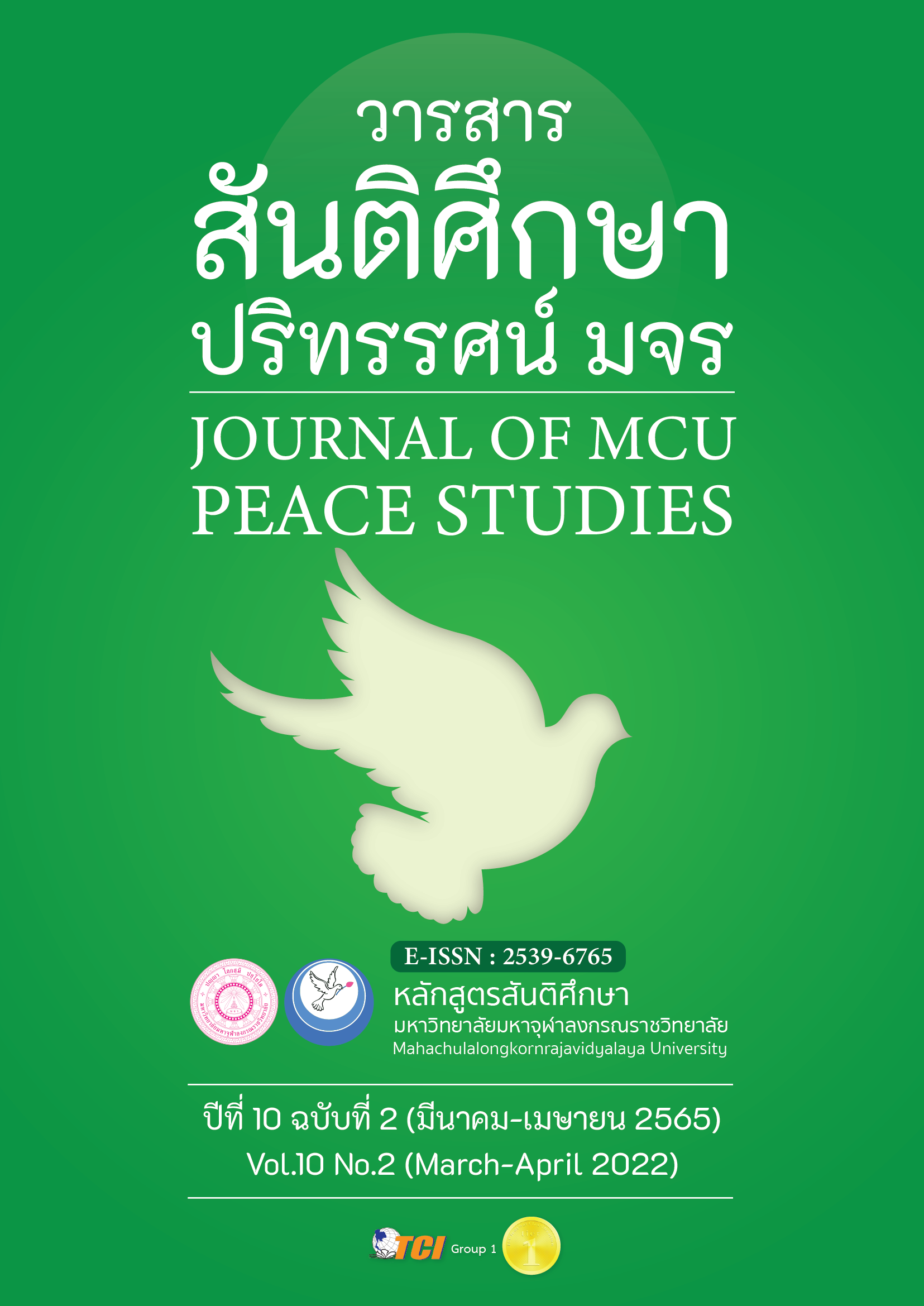แนวทางการพัฒนาองค์การภายหลังการแพร่ระบาดของเชื้อไวรัสโคโรนา 2019
Main Article Content
บทคัดย่อ
การแพร่ระบาดของเชื้อไวรัสโคโรนา 2019 ส่งผลกระทบอย่างมากต่อการพัฒนาประเทศและองค์การธุรกิจทั่วไป บทความวิชาการนี้มีวัตถุประสงค์เพื่อเสนอแนวทางในการพัฒนาองค์การภายหลังจากที่การแพร่ระบาดของเชื้อไวรัสโคโรนา 2019 โดยเสนอแนวทางใน 5 ด้าน ได้แก่ การบริหารต้นทุน การบริหารความเป็นเลิศด้านการปฏิบัติการ การสร้างพันธมิตรทางธุรกิจในแนวตั้ง การสร้างนวัตกรรม และการบริหารความหลากหลาย 1) การบริหารต้นทุน: องค์การสามารถใช้เครื่องมืองบประมาณและการจัดทำต้นทุนมาตรฐานในการควบคุม โดยจัดทำงบประมาณขาย งบประมาณการผลิต งบประมาณวัตถุดิบทางตรง งบประมาณค่าแรงทางตรง งบประมาณค่าใช้จ่ายในการผลิต และงบประมาณเงินสด ส่วนการจัดทำต้นทุนมาตรฐานเพื่อให้ทราบต้นทุนของวัตถุดิบ ค่าแรงทางตรง และค่าใช้จ่ายในการผลิตล่วงหน้า สำหรับใช้ในการบริหารการดำเนินงานในแต่ละวันให้เกิดประสิทธิผล 2) การบริหารความเป็นเลิศด้านการปฏิบัติการ: องค์การสามารถเน้นในเรื่องการสร้างวัฒนธรรมแห่งความร่วมมือ การปรับปรุงกระบวนการอย่างต่อเนื่อง การสร้างความเชื่อมโยงภายใน และผลลัพธ์ 3) การสร้างพันธมิตรทางธุรกิจในแนวตั้ง: องค์การกระทำได้ทั้งการสร้างพันธมิตรไปข้างหน้าเพื่อให้ได้
ช่องทางในการสร้างความสัมพันธ์กับลูกค้า และการสร้างพันธมิตรแบบย้อนกลับ เพื่อเพิ่มอำนาจการต่อรองกับผู้ขายวัตถุดิบ การควบคุมคุณภาพของวัตถุดิบ และการลดต้นทุนการผลิตของสินค้า 4) การสร้างนวัตกรรม: องค์การสามารถสร้างวัฒนธรรมที่สนับสนุนให้เกิดนวัตกรรมภายใน ได้แก่ ผู้นำที่มีความคิดสร้างสรรค์ การยอมรับในคุณค่าของพนักงาน ทีมงานที่มีความหลากหลาย และการให้ความเชื่อถือและความอิสระในการทำงาน 5) การบริหารความหลากหลาย: องค์การต้องบริหารความหลากหลายทางความคิดและพฤติกรรมของพนักงานที่เกี่ยวกับความรู้สึกที่โดดเดี่ยว ความกังวลเกี่ยวกับการติดเชื้อไวรัสโคโรนา 2019 และความกังวลเกี่ยวกับผลตอบแทน ความมั่นคงในงาน รูปแบบการประเมินผลการปฏิบัติงาน และการปรับเลื่อนตำแหน่ง
Article Details

อนุญาตภายใต้เงื่อนไข Creative Commons Attribution-NonCommercial-NoDerivatives 4.0 International License.
ทัศนะและความคิดเห็นที่ปรากฏในบทความในวารสาร ถือเป็นความรับผิดชอบของผู้เขียนบทความนั้น และไม่ถือเป็นทัศนะและความรับผิดชอบของกองบรรณาธิการ ยินยอมว่าบทความเป็นลิขสิทธิ์ของวารสาร
เอกสารอ้างอิง
Blocher, E.J., Stout, D.E., Juras, P.E. and Cokins, E. (2019). Cost management : A strategic emphasis. (7th ed.). New York : McGraw-Hill/Irwin.
Brooks, S. K. et al. (2020). The psychological impact of quarantine and how to reduce it: Rapid review of the evidence. The Lancet, 395, 912–920.
Crawford, C.M. and Di Benedetto, C.A. (2020). New Products Management. (12th ed.). Ohio: McGraw-Hill Education.
Ely, R.J., & Roberts, L.M. (2008). Shifting frames in team-diversity research: From difference to relationships. In A.P. Brief, Diversity at work. United Kingdom: Cambridge University Press.
Engelbrecht, W., Shah, T., Schoen, A. and Nevin, M. (2019). Strategic alliances : An essential weapon in the growth arsenal. Retrieved October 19, 2021, From https://www2.deloitte.com.
Gimenez, C., Sierra, V., & Rodon, J. (2012). Sustainable operations: Their impact on the triple bottom line. International Journal of Production Economics, 140(1), 149–159.
Hay Group. (2005). The innovative organization: Lessons learned from most admired companies. Hay Insight Selections.Retrieved October 22, 2021, from http://www. haygroup.com.
Hill, C.W.L., Schilling, M.A. & Jones, G.R. (2019). Strategic Management: Theory & Cases. (13th ed.). Mason: Cengage Learning.
Hillton, R. and Platt, D. (2020). Managerial accounting: Creating value in a dynamic business environment. (12th ed.). New York: McGraw-Hill Education.
Hussey, J. and Hussey, R. (2017). Cost and management accounting. (2nd ed.). Basingstoke: Macmillan Press.
Kulkalyuenyong, P. (2018). Strategies in Building Corporate Entrepreneurship. Journal of Humanities Social Sciences, 4(1), 1-11.
Lanen, W.N., Anderson, S.W., Maher, M.W. (2020). Fundamentals of cost accounting. (6th ed.). New York: McGraw-Hill Education.
Ministry of Public Health, Department of Disease Control. (2021). Corona Virus Disease (COVID-19): Thailand Situation. Retrieved October 31, 2021, from https://ddc.moph.go.th.
Oprea, B. T., Barzin, L., Vîrgă, D., Iliescu, D., & Rusu, A. (2019). Effectiveness of job crafting interventions: a meta-analysis and utility analysis. European Journal of Work and Organizational Psychology, 28(6), 723-741.
Ozcelik, H., and Barsade, S. (2018). No employee an island: Workplace loneliness and employee performance. Academy of Management Journal, 61(6), 2343-2366.
Paquin, R. & Prouty, K. (2015). Achieving operational excellence in food & beverage. Retrieved October 23,2021, from http://justfooderp.com.
Schwartz, J., Hatfield, S., Scoble-Williams, N., & Volini, E. (2020). Workforce strategies for post-covid recovery. Retrieved October 23, 2021, from https://www2.deloitte.com.
Shellenback, K. & Polovina, S. (2020). The design of work post COVID-19. Retrieved October 23, 2021, from https://www.mercer.com.
Shingo Institute. (2021). The Shingo model : for operational excellence. Retrieved October 18, 2021, from https://www.academia.edu/15998513/.
Stoner, C.R. and Russell, L.A. (1997). Creating a culture of diversity management: moving from awareness to action. Business Forum, 22(2-3), 6-12.
UNDP and UNICEF. (2020). Socio-economic impact assessment of COVID-19 in Thailand. Retrieved October 17, 2021, from https://www.unicef.org/thailand/media.
Wheelen, T.L., Hunger, J.D., Hoffman, A.N. and Bamford, C.E. (2018). Strategic management and business policy: Globalization, innovation and sustainability. (15th ed.). New Jersey : Prentice Hall.
Zawislak P.A. et al., (2011). Innovation capabilities of the firm: The Brazilian experience. In: 9th Globelics International Conference, November, 2011, Buenos Aires, Argentina. Proceedings of the GLOBELICS, 2011.


